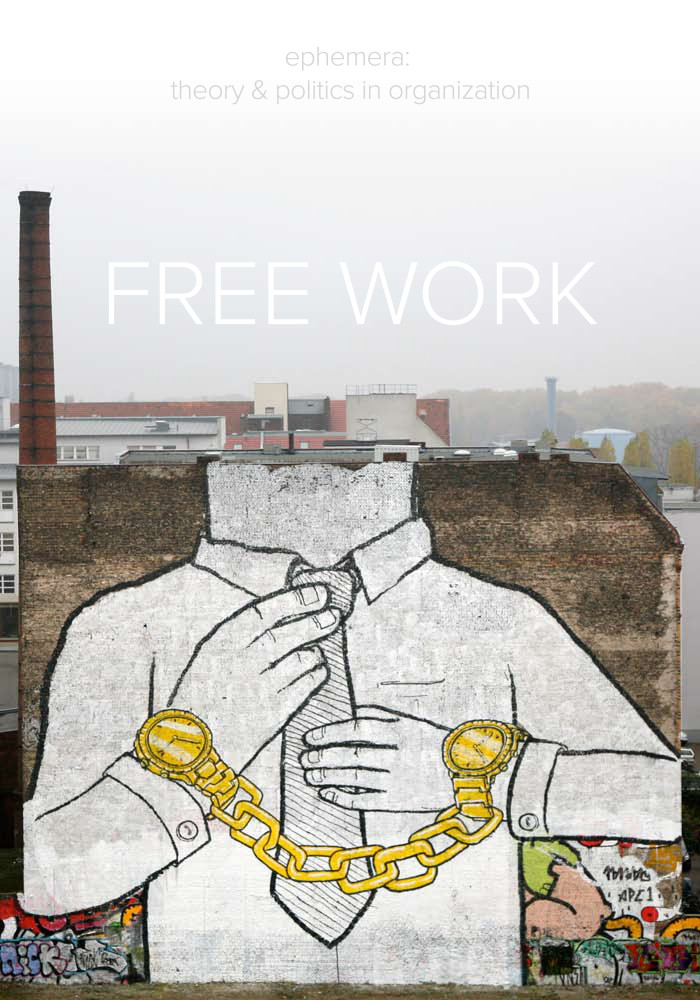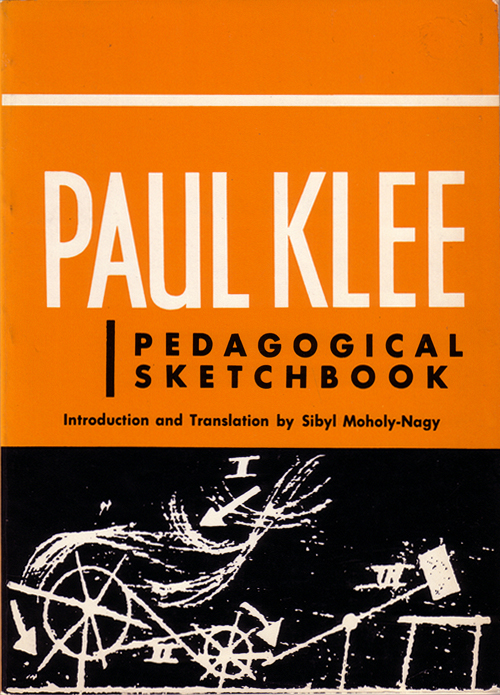Ephemera: Theory & Politics in Organization: The Free Work Issue (2013)
Filed under journal | Tags: · art, ethics, labour, theory, work

The relationship between freedom and work is a complex one. For some, they are considered opposites: ‘true’ freedom is possible only once the necessity of work is removed, and a life of luxury attained. For others, work itself provides an opportunity to achieve a sense of freedom and authenticity. In recent years for example, advances in human resource management have promoted hard work, a deep sense of commitment to one’s job, and the acceptance of working conditions that are ostensibly exploitative, as offering the promise of freedom. Recent corporate and entrepreneurial celebrations of playfulness also provide examples of the deep entanglement of contemporary forms of knowledge work with ideals of freedom.
In this issue of ephemera, our contributors inquire into the relation between freedom and work. They ask, for example, whether it is even possible to free oneself from ideals of freedom? Or is the fantasy of an imagined place of freedom, the utopia in which no work taints our lives, simply too prevalent? It may be the case that in contemporary life, we fool ourselves yet further when we ask for freedom within our working life. But can we free ourselves from the very prospect of freedom?
Volume 13, Number 1
Publisher ephemera editorial collective in association with MayFlyBooks, February 2013
Creative Commons Attribution-Noncommercial-No Derivative 3.0 Unported license
ISBN 9781906948160
201 pages
PDF
View online (HTML and PDF articles)
Back issues
Paul Klee: Pedagogical Sketchbook (1925–) [DE, EN, GR, RU]
Filed under book | Tags: · art, art education, bauhaus, colour, design, drawing, painting, theory

“Paul Klee occupies a unique position among the creators of modern art. Although he shed all ties with conventional presentation, he developed a closer and deeper relationship to reality than did most painters of his time. Without any attempt at imitation or idealization, he recorded proportion, motion, and depth in space as the fundamental attributes of the visual world.
Klee collected his observations in his Pedagogical Sketchbook intended as the basis for the course in design theory at the famous Bauhaus art school in Germany. From the simple phenomenon of interweaving lines, his work leads to the comprehension of defined planes-of structure, dimension, equilibrium, and motion. But he employs no abstract formulas. The student remains in the familiar world-a world that acquires new significance through the straight forward approach of Klee’s simple, lucid drawings and his precise captions. Chessboard, bone, muscle, heart, a water wheel, a plant, railroad ties, a tightrope walker-these serve as examples for the forty-three design lessons.
Pedagogical Sketchbook is a vital contribution toward a more human, more universal goal in design education the work of a visionary painter who dedicated himself to the practical task of making people see.” (from the Back cover)
Publisher Albert Langen, Munich, 1925
Volume 2 of Bauhausbücher series
50 pages
English edition
Introduction and Translation by Sibyl Moholy-Nagy
Publisher Frederick A. Praeger, New York, 1953
The original layout by L. Moholy-Nagy has been retained
65 pages
Pädagogisches Skizzenbuch (German, 33 MB, via Bibliothèque Kandinsky, added on 2014-8-17, updated on 2022-4-13)
Pädagogisches Skizzenbuch (German, PDF, JPG, in Heidelberg U Library, added on 2019-7-7)
Pedagogical Sketchbook (English, 1953 edition, no OCR)
Pedagogical Sketchbook (English, 1960 edition, 7th printing from 1972)
Παιδαγωγικό Σημειωματάριο (Greek, trans. Β. Λαγοπούλου, 1976)
Pedagogikheskie eskizy (Russian, trans. N. Druzhkovoy, 2005, added on 2014-3-6)
See also other titles in the Bauhaus Books series, as well as Klee’s class notes in manuscript and an edited version of his Notebooks.
Comments (10)transversal, 01/13: The Languages of the Banlieues (2013) [EN, DE, FR, Arabic]
Filed under journal | Tags: · capitalism, cognitive capitalism, geopolitics, knowledge, knowledge production, labour, theory
“The crises within cognitive capitalism and cognitive labor are mirrored in the reproduction and exacerbation of global divisions of labor and the emergence of new forms of exploitation as part of a regime of flexible capital accumulation. While drastic austerity measures and heightened control mechanisms lead to a radical transformation of the welfare state on the one hand, new networks of communication, struggle and alternative forms of knowledge emerge on the other.
This issue of transversal attempts to review some of the general assumptions of a theory of cognitive capitalism and to unsettle the very notions of knowledge and its production, discussing the conditions of its capture, its “re-invention” and its capacity for creating worlds. The individual essays follow the lines of a (post-)colonial historicity and a feminist and geopolitical critique of capitalist valorization, thereby questioning the materiality of knowledge and its production in relation to resources and bodies, as well as how art and knowledge production are interwoven with political struggles.” (Editorial)
With contributions by Anne Querrien, Marc Hatzfeld, Amina Bensalah/Myriam Suchet, Boris Seguin, Sonia Chikh (Les engraineurs), Abdoulah Bensaid (Musik à Venir), Françoise Dibotto Soppi.
Editors: Lina Dokuzović, Therese Kaufmann, Raimund Minichbauer, Radostina Patulova
Publisher eipcp – European Institute for Progressive Cultural Policies, Vienna/Linz
Copyleft
ISSN 1811-1696
HTML (updated on 2020-4-18)
Previous issue

